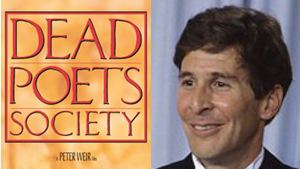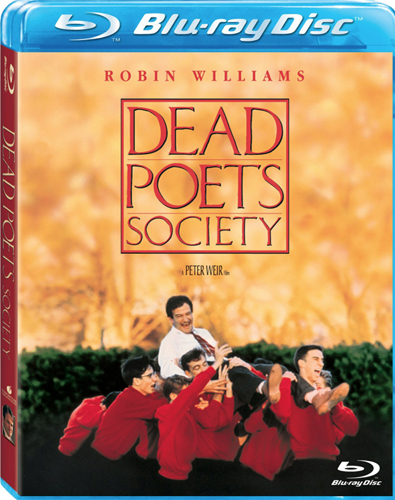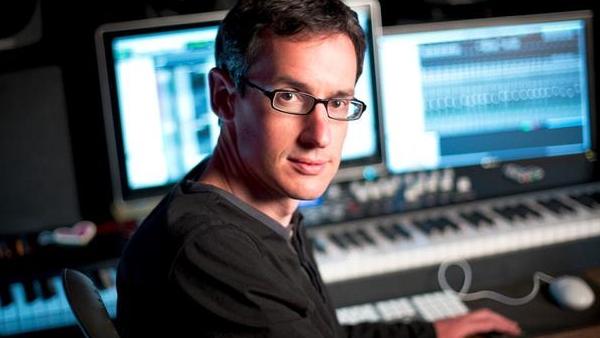 Dead Poets Society (1989), starring Robin Williams and Ethan Hawke, makes its way to Blu-ray on Tuesday (01/17/2012). This movie won 13 awards, including an Oscar for Best Writing, Screenplay Written Directly for the Screen. It was also nominated for 17 other awards. It was my honor and privilege to interview the screenwriter of Dead Poets Society, Tom Schulman.
Dead Poets Society (1989), starring Robin Williams and Ethan Hawke, makes its way to Blu-ray on Tuesday (01/17/2012). This movie won 13 awards, including an Oscar for Best Writing, Screenplay Written Directly for the Screen. It was also nominated for 17 other awards. It was my honor and privilege to interview the screenwriter of Dead Poets Society, Tom Schulman.
What follows is the transcription of my interview with Tom. While I expected him to be cordial, I was not expecting him to be extremely nice. Tom is an accomplished screenwriter, with some amazing movie titles under his belt, yet he made me feel right at home. Tom was very humble; admitting he never had any idea Dead Poets Society would achieve such accolades.
I’d like to start off by apologizing in advance for any questions I may ask, which you’ve probably heard a thousand times by now.
*laughs* Don’t worry about it.
What life experiences or other resources did you draw upon as inspiration, while writing the screenplay for Dead Poets Society?
Oh, so many. Every character in the movie was loosely based on someone I knew in life. Although, not all at the same time. In my sophomore year in high school I had an English teacher, who was partially the inspiration for the Keating character (Robin Williams). I went to a place in Los Angeles called the Actors and Directors Lab. There was a teacher brought in every six weeks or so, to review our work. He was also an inspiration for that character. All of the boys in the school were sort of plucked from various times in my life.
I realize it’s been more than 20 years since the movie was first released. But, when you completed the first draft of your screenplay, did you have any idea of the potential that this movie would eventually hold?
No. * laughs *
You know, you’re just sitting alone in a room writing something. At the time I was writing it I was just barely scraping by, getting jobs here and there. I don’t know that I ever expected to get paid, much less have any impact whatsoever.
So, would you consider Dead Poet’s Society your finest work?
It’s hard when it’s something that old, but I guess so. To me it’s probably the most personal thing I’ve written. Perhaps one of the most rewarding in terms of the excitement; watching it in theaters and seeing people’s reaction and so forth.
Where did, “O Captain, my Captain.” come from? Did you happen to hear someone say it, during the writing process, or did you just think of it?
You know I don’t really know. It wasn’t anything that anyone said. You know I always saw that character as a little bit of a teen, a little bit full of himself. It was a playful reference for the boys, but it was also more than that. Where these things come to you, in the course of writing something, is just hard to know. I was thinking about what happened in high school; so while writing this it was easier to reconnect with it.
So, how much of what Robin Williams brought to the role was unscripted?
It was more the little flourishes here and there. He invented the idea that he would ding the bell, to gong the kids wrong. It was actually something he would say, “Ding, Wrong.” The scene where he improvises John Wayne doing Macbeth, that was him. There were lines here and there. The line about going to the beach and having kids kick Byron in his face.
I did wonder about a few of those lines.
You have small copies of the script made, so people can keep it in their pocket for easy reference. When the movie was over Robin sent me a signed copy and it said, “I changed just enough to keep my reputation intact.” Everything he brought to the movie, from my perspective, was wonderful.
Do you feel like the final cut of Dead Poets Society is close to what was intended? I’ve read the screenplay and I see the ending was slightly different. Did it end up the way you expected?
Are you talking about the version where Keating had Hodgkin’s disease?
I believe so, there were also differences with the ending as well.
I do remember the scene where they were trying to force Todd to sign. I went back and forth in my own mind about it. I think Peter Weir (Director) found the answer, saying that we won’t see it. We’ll know he did because if he hadn’t signed, he would have been thrown out of school. But, we won’t actually see him do it. So, then the question becomes can he, in any way, save anything at the end of the movie. Is there anything left for those boys. The opportunity arises when the Keating character comes back into the class. As far as the Keating character having Hodgkin’s disease, it was interesting because when Peter read the script I got a call from the studio saying, he really wants to do this, but he’s got one big issue. He and I got together to talk and we said it’s one scene. As far as the execution goes, you could just take it right out. He really felt like that should not be in the movie. Then the movie would then become about a dying teacher, versus what the teacher was actually saying. As much as I felt we were losing something emotional, I also intended that disease to explain why the teacher, Robin, was so intent upon seize the day. He didn’t have that many left. Peter made the point that it’s easy for a bunch of kids to stand up at the end for someone who is dying, regardless of whether they believe what that man has to say. But, if he’s not dying then clearly they are standing up for what he taught them. That’s pretty much how it went. But, I don’t miss that part; it was a smart cut.
Throughout the entire process, from pre-production to post-production, were there any changes you weren’t happy with at the time?
No. I was on the set most of the time and it was pretty clear to me which things were working, which things needed to be tweaked and so forth. You know it was amazing because Peter went away, with the movie, to Australia for what felt like months. But, it was probably only six or eight weeks. He came back with a cut and it was just like wow, this is it. I’m thinking back now and whatever changes he made were really minor. I think the Shakespeare stuff threw me the first time I saw it. Because, it was something that was improvisation on the set. I wasn’t expecting it to be in the movie, it didn’t come out of my head. I thought at first, this is broken; it’s so contemporary. Once I saw it again, it was like ok this works. I was really happy with it.
Are you working on any new projects that we should watch for in the coming months?
Not in the coming months, but I have something that’s starting to get itself up. It’s called Morgan’s Summit, sort of half thriller, half drama. I’m excited about it, but we’ll see if it’s going to get there. We’re talking to the star at the moment, so we will see. If that works out it will go. If not we’ll keep trying.
We will certainly look forward to seeing that. Thank you for your time.
Thank you.






2 Comments
MarkusWelby1
That sir was amazing! One of my favorite films and how cool to get some insight about its genesis!
GradyM
Dead Poets Society is one of my all time favorites as well. When I was offered a chance to interview Tom Schulman, I had to read the e-mail twice and pinch myself. I was humbled that he would even talk to me. My transcription of the interview doesn’t do him justice, he was great. The whole experience was very surreal.